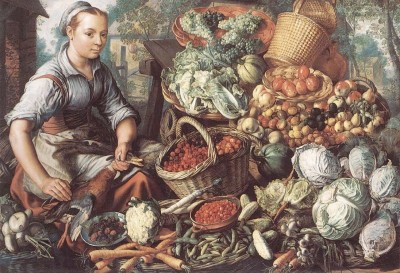
Commerce: The Permanent Rebellion
Freemason Perspective

Commerce, by its very nature, is born free. And more than this, it forever fights to remain free. At almost every time and place, commerce evades regulations and controls; it serves its own will, not the wills of rulers. Markets spontaneously emerge at every opportunity, even when they are outlawed and punished. Commerce seems to have an existence of its own, like an independent organism.
Even under the worst oppressions recorded in history, commerce continued. This was true in the USSR and it was true in Nazi Germany, and it remains true now, even as the Western world runs headlong into a surveillance-state abyss.
All that said, please don’t imagine that in referring to commerce, I am including the mega-corps that seek to dominate the Earth in partnership with states. That is not at all what I mean, as I will explain below.
I’m going to start this issue by explaining the depth of this rebellion, which is permanent; it continues in our time as in all others.
Opposing Models
Commerce does not rebel against regulation because of excesses. Rather, it is contrary to regulation by its very nature.
Commerce is a productive strategy. Strategies that exert control over commerce are oppositional – they restrain production. The two are inherently opposed: on one side are people struggling to produce, and on the other are people struggling to either slow production or to skim it away.
In 1908, Franz Oppenheimer, a German physician and sociologist, published a book entitled The State. In it, he made the very important observation that there are only two primary modes of survival upon planet Earth: The Political means and the Economic means. Oppenheimer says this:
There are two fundamentally opposed means whereby man, requiring sustenance, is impelled to obtain the necessary means for satisfying his desires. These are work and robbery, one’s own labor and the forcible appropriation of the labor of others.
This stark statement is crucial for understanding how men live in this world – and how they have always lived in it: Men survive by either producing or by taking the goods of others. However many layers of publicity and complication there may be, every act by which men feed themselves can be broken down into one or the other of these two.
The great problem with the above statement has never been a question of its truthfulness but that so many people are uncomfortable facing such a truth directly.
The statement that commerce and regulation are eternally at odds is merely a restatement of Oppenheimer.
Acts of Will
Both commerce and control involve acts of will.
- Commerce involves individuals choosing to perform productive actions, such as growing food, making shoes, and so on.
- Control involves individuals choosing to allow or disallow the willful acts of the productive, or to remove the fruits of production from the producers.
Commerce is an effect of active will. Commercial controls are the implementations of contrary wills, seeking to restrain the commercial will. The two are eternally at odds.
It is worth explaining here that the controllers of the Earth (that is, the various state rulers) are always forced to undermine independent will. They do this, not because they are all inherently cruel, but because their enterprises become nearly impossible if they don’t suppress individual will.
Ruling men by force alone is expensive; far too expensive to support rulership over a significant area. People who are ruled in that way quickly learn to hide their produce before it can be taken, or simply to run away. You cannot cage intelligent beings like you can beasts – it doesn’t work; they adapt.
To rule humans effectively, you must subvert their wills. You must make them believe that their wills are flawed and that using them is wrong. This is, of course, precisely what has been done since several millennia BC.
The will behind commerce, however, is born of the desire to survive, and that is not something that can be trained away. The survival instinct is permanent, and commerce endures as its great tool. Even though people have been deeply conditioned to surrender their wills to the state, they remain able to use their wills for survival, and that leads directly to commerce.
And since survival is hard-wired into us, commerce always pops back up, no matter how hard it is put down. However much it may be punished or repressed, it will forever rebel and return. Commerce is a permanent rebellion.
Because of this, nearly all arguments against it – certainly from the ruler’s side – are based on the need to restrain freedom. As economist Milton Friedman once wrote:
Underlying most arguments against the free market is a lack of belief in freedom itself.
[Editor's Note: This article is an excerpt from our flagship newsletter – Freeman's Perspective – Issue #29: Commerce: The Permanent Rebellion. If you liked it, consider taking a risk-free test drive. Not only will you gain immediate access to the rest of the issue (which shares fascinating examples on how commerce thrives in some surprising places), but you'll also be able to enjoy the entire archive – more than 520 pages of research on topics of importance and inspiration to those looking for freedom in an unfree world. Plus valuable bonus reports and all new issues as well. Click here to learn more.]
Paul Rosenberg
http://www.freemansperspective.com/commerce/
